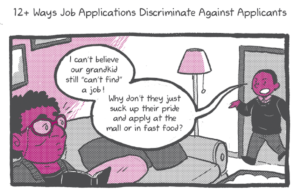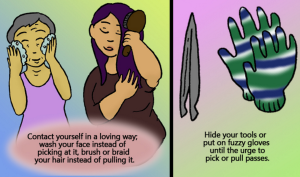
“Credit: ClipartOf”
Becoming a mother is not easy. Your body changes in unexpected ways. You probably have no idea what to eat to promote healthy brain growth or what kinds of diapers you need. You worry about how long your labor will last and how bad the pain will be.
And there are a million classes you can take and books you can read about the prenatal process – how to avoid certain medications; how to exercise properly while pregnant; what contractions will feel like; how to eat a nutritious diet.
But unfortunately, even though most of these books provide helpful information, they also tend to serve as a scare tactic to get women worked up about the “what-ifs” that may occur.
There is constant pressure on mothers to be sure they are doing everything perfect to raise their children according to the standards set by society. (And oftentimes, fathers are not held to the same rigid standards, but that’s a topic for another article).
The process of raising a newborn and insuring that they are happy, healthy, and well fed is complicated by the pressures to do it “right.”
That feeling tells you that it’s easy to screw up parenting and that your child will never become an honors student unless you “raise them right.” And that fear can seriously mess up your ability to figure out what your child needs.
Instead of focusing on the unique needs of your child and you as a mother, you end up being focused on what you think your child “should need” or what you “should do.”
So How Do New Mothers Get Helpful Information Without Feeling External Pressure To Be Perfect?
Instead of dictating how to do it, we want to approach early motherhood differently. With the help of a loving mother who has undergone several pregnancies, we are simply going to offer advice for soon-to-be mothers and those recently inducted into motherhood to help them figure out what’s best for them.
1. Don’t read all the baby books. If the latest and greatest childcare book says that your baby should be walking at 12 months and he doesn’t walk until 15 months, don’t sweat it! Every child is different. As a mother, you will know when something doesn’t seem right and when it’s time to seek outside help.
How? Concentrate on the baby because she will tell you what she needs. She will tell you when she wants to be held and when she is hungry. That means that you shouldn’t follow textbook advice on how much the infant should be held or fed. Some days, the newborn may need to be fed more than once if she didn’t get enough milk the first time or spit up her most recent meal and other days, she will just want to be comforted.
2. Reach out and find a support network for the first couple of weeks. You can do this before the baby arrives or in the first few days after the baby is born. Having a support network of experienced women whom you trust to talk to is key. It allows you to ask women who have gone through the process before whether what you are seeing and feeling is “normal.” There are many intimate questions that you will have after you give birth about nipples, vaginas, and bodily functions so having someone experienced that you trust will be very important. Plus, it really helps to have additional hands on deck during your recovery process if you already have a toddler running around.
On the other hand, be wary of mothers (and others) who attempt to solicit unwanted advice. A perfect example of the societal watchdog on motherhood is the recent push for mothers to breastfeed. Yes, breastfeeding is very beneficial for your child. However, it’s not for everyone. You should do what feels right for you, your baby and your body. If you do find that breastfeeding is right for you, there are great sources of information out there, like La Leche League, an organization that provides information about breast feeding, offers mother-to-mother forums and allows you to ask questions.
3. Don’t worry if you don’t feel an immediate bond with your child. In the past people would immediately question mothers who didn’t claim to feel an immediate bond with their newborn. Fortunately, this has mostly gone by the wayside as doctors, psychologists and others have done research and realized that just like forming new bonds with other people, sometimes it takes time. Check out this great article, Bonding with your newborn, for more information.
4. Be aware of and on the lookout for post-partum depression. Familiarize yourself with the symptoms of it and watch for the signs. Post-partum depression is very real and can be debilitating so reach out for help if you need it. Symptoms of post-partum depression include anger, anxiety, and changes in appetite. Post-partum depression can make it extremely difficult for you to connect with your baby and the people around you in your life after you have given birth. The depression can make you feel like you’re failing and have you ask yourself why you are such a bad mother. Please remember that this is the post-partum depression talking and not necessarily the truth.
Unfortunately, many women feel immense shame when they develop post-partum depression because they feel like they are alone. They often have internalized the pressures to be the perfect mother, and post-partum depression flies in the face of those expectations. It is important to know that post-partum depression is actually quite common. Please don’t be ashamed of it, and if you think you have it, seek help immediately.
5. Be very patient with yourself through the recovery process. Just as there is no “right” way to mother, there is no “right” length of time before you recover from childbirth. After giving birth to some children, it may take month before you physically recover. With others, it can take a matter of days.
Just remember to give yourself some slack and to be patient with yourself and your body.
6. Every baby is different. Just because you “figured out” the needs of one newborn doesn’t mean that your next child will have the same needs. Every child is very different and it’s common to find that what works for the first child will not work with the second.
For example, one newborn may be perfectly comfortable being out in social settings like malls while his or her siblings are easily overwhelmed and cry. That’s ok. It doesn’t mean you don’t know how to take care of your child. You just get to learn about the unique qualities of your new child.
7. Your capacity to love will expand and grow tremendously and will continue to increase with each child. Having children teaches you a lot about your capacity to love. Having children doesn’t mean that you will section your heart into smaller and smaller equal sections with each addition to your family.
Rather, your heart expands – so having two children won’t feel like you are splitting your heart in half, with one section for each child, but rather as though you have two whole hearts. It’s a real sense of unconditional and expansive love.
For new mothers, having a newborn can be immensely terrifying. For nine months you have eaten well, worked out and prepared, but once the baby is born, it all becomes real.
Just remember that we are all in this together and that nobody has mastered the correct formula despite what naysayers and the media may try to tell you.
We hope our advice has been helpful and would like to hear from all you new mothers out there! What has helped you and what would you advise other new moms?
Amy Shaw is a Contributing Writer for Everyday Feminism. She is a recent graduate from Washington College where she studied International Studies and History and is currently working in Missoula Montana. Amy loves spending time outside, listening to music, and trying new vegetarian recipes.
Shannon Ridgway is a Contributing Writer for Everyday Feminism from the great flyover state of South Dakota (the one with the monument of presidential heads). In her free time, Shannon enjoys reading, writing, jamming out to ’80s music and Zumba, and she will go to great lengths to find the perfect enchilada. Follow her on Twitter @sridgway1980.
Search our 3000+ articles!
Read our articles about:
Our online racial justice training
Used by hundreds of universities, non-profits, and businesses.
Click to learn more
Most Read Articles
- « Previous
- 1
- …
- 30
- 31
- 32




















